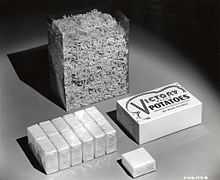Instant mashed potatoes

Instant mashed potatoes are potatoes that have been through an industrial process of cooking, mashing and dehydrating to yield a packaged convenience food that can be reconstituted by adding hot water or milk, producing a close approximation of mashed potatoes. They are available in different flavors. They are occasionally packaged with instant gravy.
Mashed potatoes can be reconstituted from potato flour, but the process is made more difficult by lumping; a key characteristic of instant mashed potatoes is that it is in the form of flakes or granules, eliminating the chunkiness. Analogous to instant mashed potatoes are instant poi made from taro and instant fufu made from yams or yam substitutes including cereals. Poha, an instant rice mush, is also much in the same spirit, as more broadly are other instant porridges, formed from flakes, granules, or pearls to avoid lumping. Brands include Smash and Idahoan mashed potatoes.
Flaked instant mashed potatoes are the most common found in the local United States and Canadian stores. Granulated or Potato Pearls are generally reserved more for institutional or restaurant use. Granulated mashed potatoes can be found in some wholesale clubs or are available through those that carry dehydrated or survival foods. Unlike the flaked mashed potatoes, both of the granulated and pearls will be more hygroscopic when it mixes with water. They will generally have an improved flavor, higher yields, and a firmer mix, in that regard. [citation needed]
History

The practice of drying and grinding starchy root vegetables for preservation and portability is widely attested around the world, and likely dates back to before the advent of agriculture. Potatoes in particular have been freeze-dried since at least the time of the Inca empire, in the form of chuño; another example is in Japanese Ainu cuisine. In 1962 the Canadian Edward Asselbergs invented the first form of instant mashed potatoes.[1]
Nutrition
Instant mashed potatoes have substantially more sodium than fresh potatoes, and much less dietary fibre. In other respects they are similar to mashed fresh potatoes in their nutritional qualities, about two-thirds starch by dry weight, with smaller amounts of protein, dietary fiber, and vitamins. The largest difference is the loss of vitamin C, although some products may be enriched to compensate. One hundred grams of unenriched instant mashed potatoes provides 11% [2] of the Dietary Reference Intake of vitamin C, compared to 18% [3] provided by the fresh potato version.